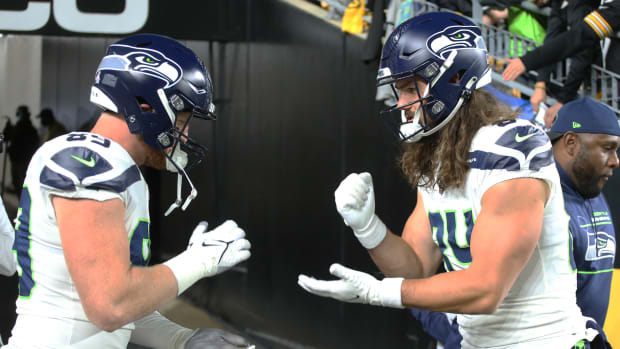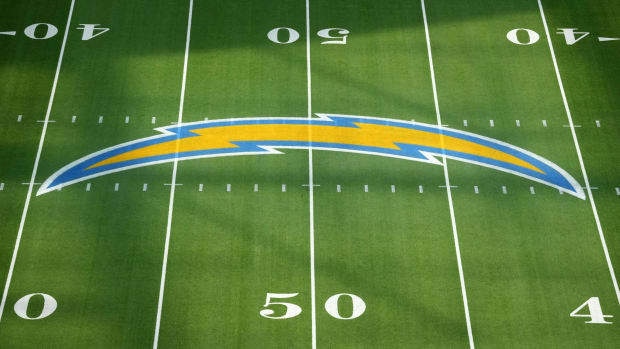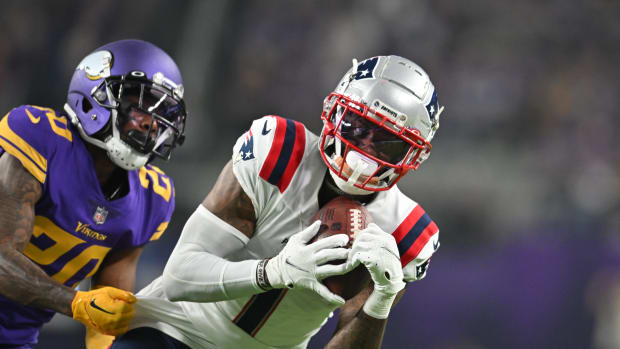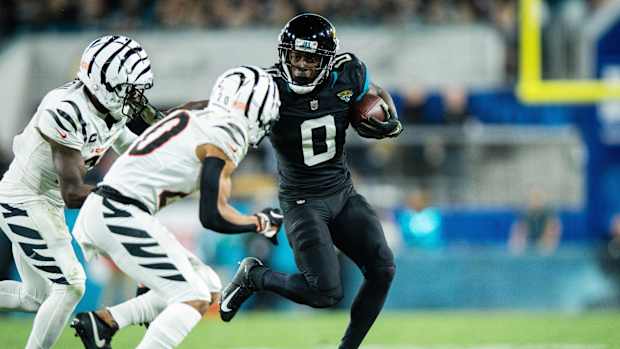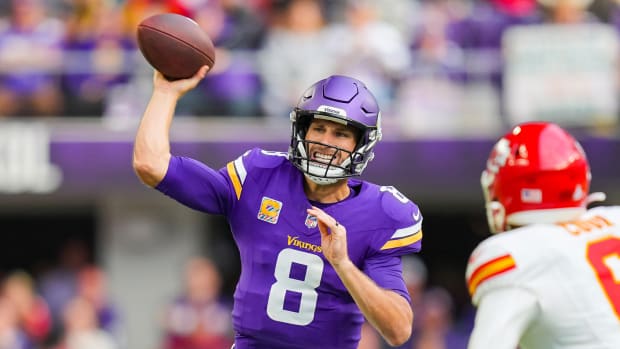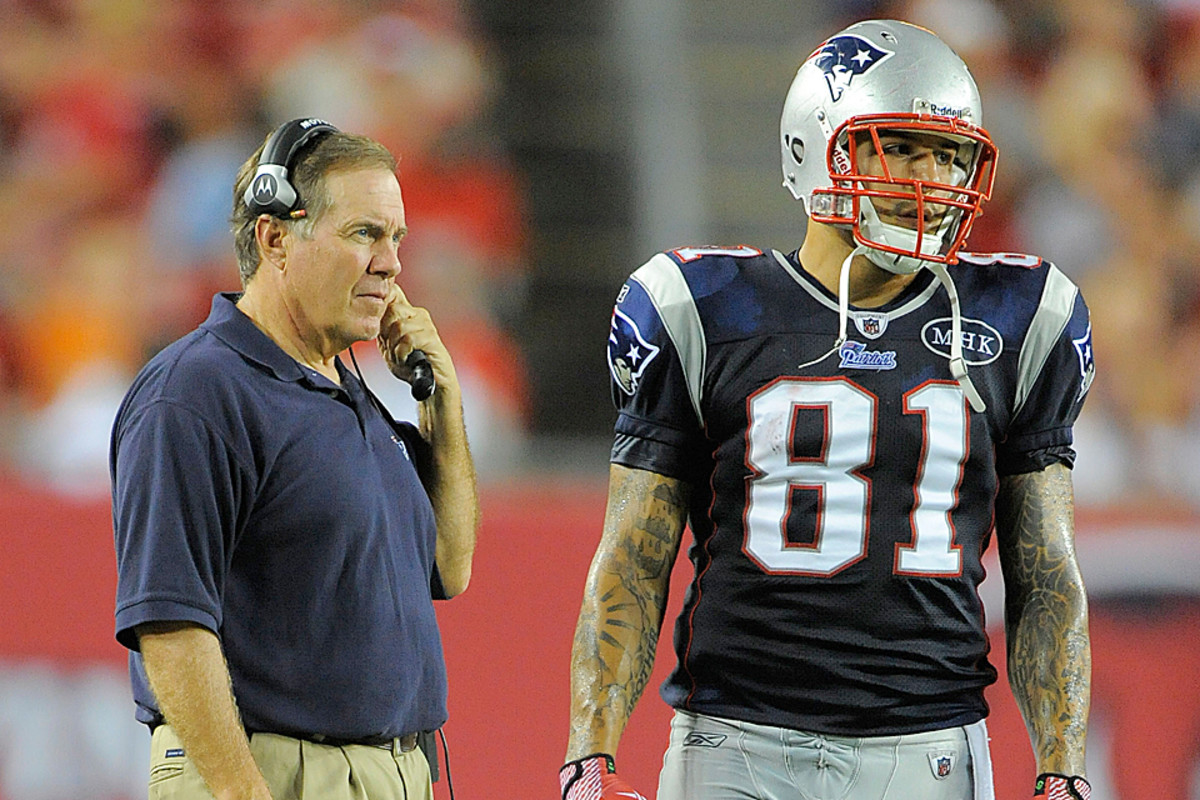
What Did They Know? What Can They Learn?
In the wake of the arrest and, now, the first-degree murder conviction of former Patriots tight end Aaron Hernandez, some have felt the need to make this a larger issue, especially on national television outlets.
Should this change the way the NFL does business? Will it? What kind of lessons should the NFL take from this? Will this cause them to scrutinize draft prospects more in the future?
Stop.
At the same time owner Robert Kraft was testifying for the prosecution against his former employee, the Patriots were reportedly extending a contract offer to then-free-agent linebacker Rolando McClain, whose background was more troubling than Hernandez’s was at the time the team drafted him out of Florida or when it gave him a contraction extension.
The eighth overall pick, by Oakland, in 2009, McClain was arrested in 2011 for misdemeanor assault, discharging a firearm and reckless endangerment. Two years later he was arrested for providing false information to the police. Then 10 days after signing with the Ravens, McClain was arrested for disorderly conduct. McClain retired in 2013 to get his personal life in order. “I felt like Aaron Hernandez, like I just wanted to kill somebody," McClain told ESPN The Magazine. He came back to the Ravens but was late for and then failed his conditioning test. He retired again. “I gotta follow my heart,” he said in a text to ESPN. “It ain't football. If football made me complete I would play. But whenever I think of it my heart pulls me away from whatever reason. ... This means I'm done.”
Jared Wickerham/Getty Images
The Cowboys traded for McClain in July, and he had a great season as the gel for a resurgent Dallas defense. Yet, McClain slipped again and is facing a fine and/or four-game suspension for another failed drug test.
So with all that as background, and just one season of productive football under his belt, the Patriots offered McClain a contract, according to the Boston Herald.
In other words, if nothing has changed for the team that employed Hernandez, nothing is changing for the NFL at large.
Is that wrong? Not necessarily. In every line of work, there are bad people. There are bad cops, bad politicians, bad media members, etc. But we realize they are just a few bad apples. The same applies, especially, with football, where on-field violence is encouraged and developed.
The balancing act of weighing risk versus reward will continue. It was what the Patriots did with Hernandez. However, there is one area where they should have done better, and where teams can learn a lesson.
On Players We Don't Know
A former front office exec and player agent, The MMQB's Andrew Brandt shares his thoughts on Jameis Winston, Darren Sharper and Aaron Hernandez. FULL STORY
I was a guest on Nashville’s 102.5 FM The Game on Wednesday evening, and one of the co-hosts of the program, Sports Night, is former NFL general manager Floyd Reese. Before retiring, Reese was a senior football advisor with the Patriots from 2009 to 2012. Hernandez was drafted in 2010.
One of the questions I had while covering the Patriots: How aware was the team regarding the issues that Hernandez had at the University of Florida, which came to light publicly after his arrest? According to Reese, they knew.
“We knew he had some issues prior,” Reese said. “[Former Florida coach] Urban Meyer and Bill [Belichick] were very, very close, and I think Urban convinced Bill that, you know, that these things weren’t going to be an issue. When we structured his first contract, his rookie contract, we probably had 75 percent of the money in the contract set up so that he would only make it if he stayed out of trouble, didn’t miss meetings, was always there doing the right thing. And for the period of the original contract, he lived up to every bit of it. So it turned out well. Of course, after that, after he signed [his $40 million contract extension], things kind of went awry.
“When he was at Florida, he had some issues there too, there were some things that went on. We all knew about it. It was just from our standpoint, we were getting a first-round talent in the fourth round under a contract that was going to keep him in line or it wasn’t going to cost us a penny. The real downside for us was the fourth-round pick. The upside was he ending up being an All-Pro, for a while, until he got his second contract.”
An Enigma On Trial
Ex-Patriots beat writer Greg Bedard visited the Aaron Hernandez trial, bringing back memories of covering the sometimes genial, sometimes volatile young star. FULL STORY
According to Reese, where the Patriots really erred with Hernandez was in failing to keep tabs on a player who grew up around the area. Hernandez hails from Bristol, Conn., which is less than two hours from Foxboro.
“Aaron was not the kind of guy that was going to go out after practice, meet up with five or six guys and have dinner,” Reese said. “There were a lot of times where he would leave Foxboro and drive back to Hartford so he could be with his guys. Lawrence Phillips… was the same thing at Nebraska. I had a psychiatrist tell me he was imprinted. It meant there were only certain places he felt comfortable. ... I think we saw issues with Pac [Adam Jones] with that. Aaron was definitely into that kind of thing. Foxboro is very small city, based around the Patriots. And that was not a real comfort level for him..
“Aaron grew up in a tough environment, but he went to the University of Florida to get away from Hartford. To get away from that environment. He knew it would be better for him… The truth is, the vast majority of guys that have maybe had a tough upbringing, when you throw them into a great locker room, great organization, great place to play, they come out of it. They see the other side of it. ‘Why would I ever want to go back to that other place?’ The problem is you run into an Aaron Hernandez, who can’t get there. He’s comfortable back in Hartford ... with all that trouble.”
If the Patriots, or any team, knows that a player is often going back to his hometown (and in Hernandez’s case, a place he fled from for college), they better be darn sure they understand what type of people he is associating with. Because it won’t be long before the people from his past are in Foxboro, in the circle of influence for the player and the team. If you’re drafting a hometown player, you should know backwards and forwards how that’s going to affect him.
Other than that, it will be business as usual in the NFL. The Patriots’ courtship of McClain (and there are other examples across the league, including the Ravens’ signing troubled cornerback Victor Hampton less than a year after the Ray Rice incident), tells us that much.
Peterson’s time in Minnesota could—and should—be numbered. (Photo by Carlos M. Saavedra/SI)
Nickel Package
1. Now that Adrian Peterson has been reinstated by the league, it’s time for the Vikings to trade him. He’s due to count $15 million to $17 million against the cap in each of the next three seasons, and Minnesota could use that money to invest in the rest of the team. Peterson is a great player, but we’ve seen time and time again that you don’t need a great running back to win the Super Bowl. You need a great team, and the Vikings still have work to do in that regard. And with Peterson continuously voicing his displeasure with the team, trading him is a no-brainer. If he doesn’t want to be there, don’t let him. The Vikings should take whatever they can get for Peterson and wash their hands of him.
Bedard on Prospects
Marcus Mariota: Everything but the fireJameis Winston: Is he worth the trouble?Melvin Gordon: Can he break the RB first-round drought?Amari Cooper: Is he worth a top-10 pick?Randy Gregory: The NFL’s next great pass rusher, if...
2. On a related note, if I’m Chargers general manager Tom Telesco, and I feel Marcus Mariota will be at least a very good player, I’m thinking long and hard about trading Philip Rivers to the Titans for the second overall pick. Rivers will be 34 in December, and he has constantly battled injuries the past two seasons. An extension, which Rivers hasn’t played ball on yet, will cost the team around $20 million per season. Greg Robinson, the second overall pick last year (where Mariota would be taken), had a cap number of $3.87 million as a rookie, which grows to $6.8 million in 2017. Rivers is a great player, and I’ve been a big fan, but the Chargers should have legitimate concerns about whether a “push thrower” like Rivers will tail off quickly. You weigh that against drafting Mariota, who has the potential to be great for the next 10 years, with a cap hit that won’t reach double figures for at least five years, and it’s a very close call. If I’m Telesco, I roll the dice. But then, I’m convinced Mariota will be a great quarterback. At the end of the day, I don’t see the Chargers pulling the trigger.
3. When Jameis Winston’s attorney, David Cornwell, spoke at the Villanova symposium put together by colleague Andrew Brandt, Cornwell set off alarm bells when he said about Winston, “I doubt that he is the first NCAA athlete to demonstrate that he’s immature and a knucklehead. Jameis is ready to be an NFL quarterback on the field, but he is not ready to be an NFL player off the field.” Now, in the context of all incoming rookies, Cornwell’s comments are correct. Rookies have no idea how their lives will change once they get to the NFL, and they’re not prepared for it. But in the context of Winston being selected first overall as a quarterback, and the face of a franchise, it is concerning. This is the issue with Winston, just as it was with Johnny Manziel a season ago. Quarterback is and should be viewed differently from every other position. How many great NFL quarterbacks came into the league as immature knuckleheads? I can think of one: Brett Favre. And he had his struggles, including being traded after one season with the Falcons, before he became great. History would tell you that if you’re not steady off the field as a franchise quarterback, it’s very hard to get straight on the field. That’s the dilemma with Winston. Being a franchise NFL quarterback is just different.
The Man Behind Modern NFL
Joel Bussert counseled three commissioners over 40 years, always championing the quality of the game. FULL STORY
4. Don’t let the topic—the retirement of a longtime league executive—scare you off: If you love the NFL, you must read Peter King’s profile of Joel Bussert, the senior vice president of player personnel and football operations. Not only is it terrific, but it drives home a very important point. Bussert was the protector of the game, not the shield, for 40 years. There’s a big difference, one that some very important people in the league (ahem, Roger Goodell) sometimes lose sight of. What’s in the best interest of the game should always be paramount. Hopefully there is someone who will step up and protect the game from the suits once Bussert departs.
5. R.I.P. Packers legend Lee Remmel, public relations director and historian, who passed away on Thursday. As far as the Packers go, he saw it all, from Curly Lambeau and Don Hutson to Mike McCarthy and Aaron Rodgers. In my time covering the Packers, I had a handful of conversations with him because Remmel knew everything. He was always gracious, and one of the kindest people I’ve ever known. The Packers and the NFL lost a true keeper of the flame.
Follow The MMQB on Facebook, Twitter and Instagram.
[widget widget_name="SI Newsletter Widget”]







































